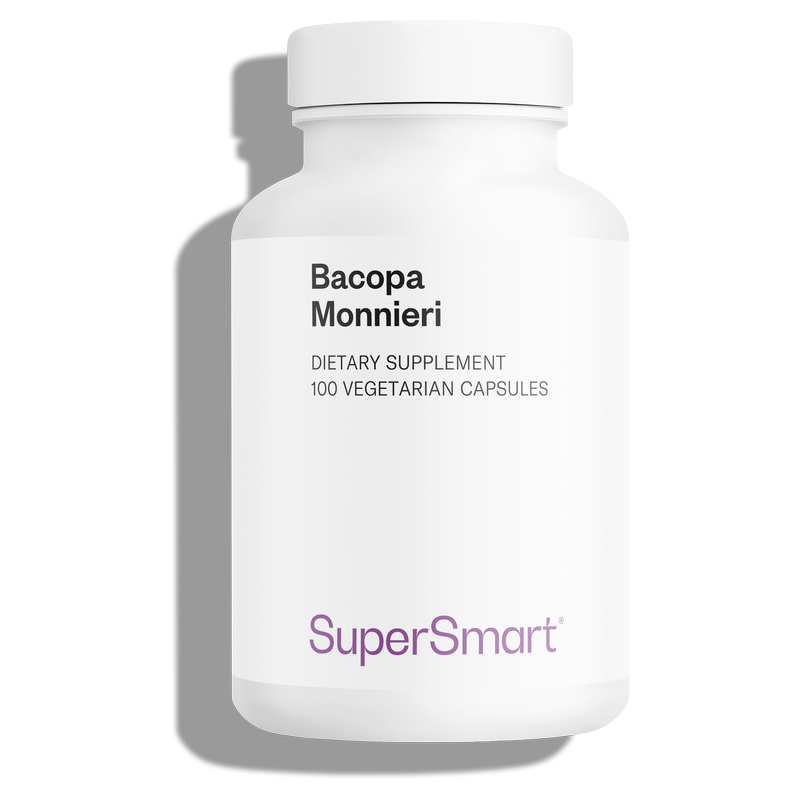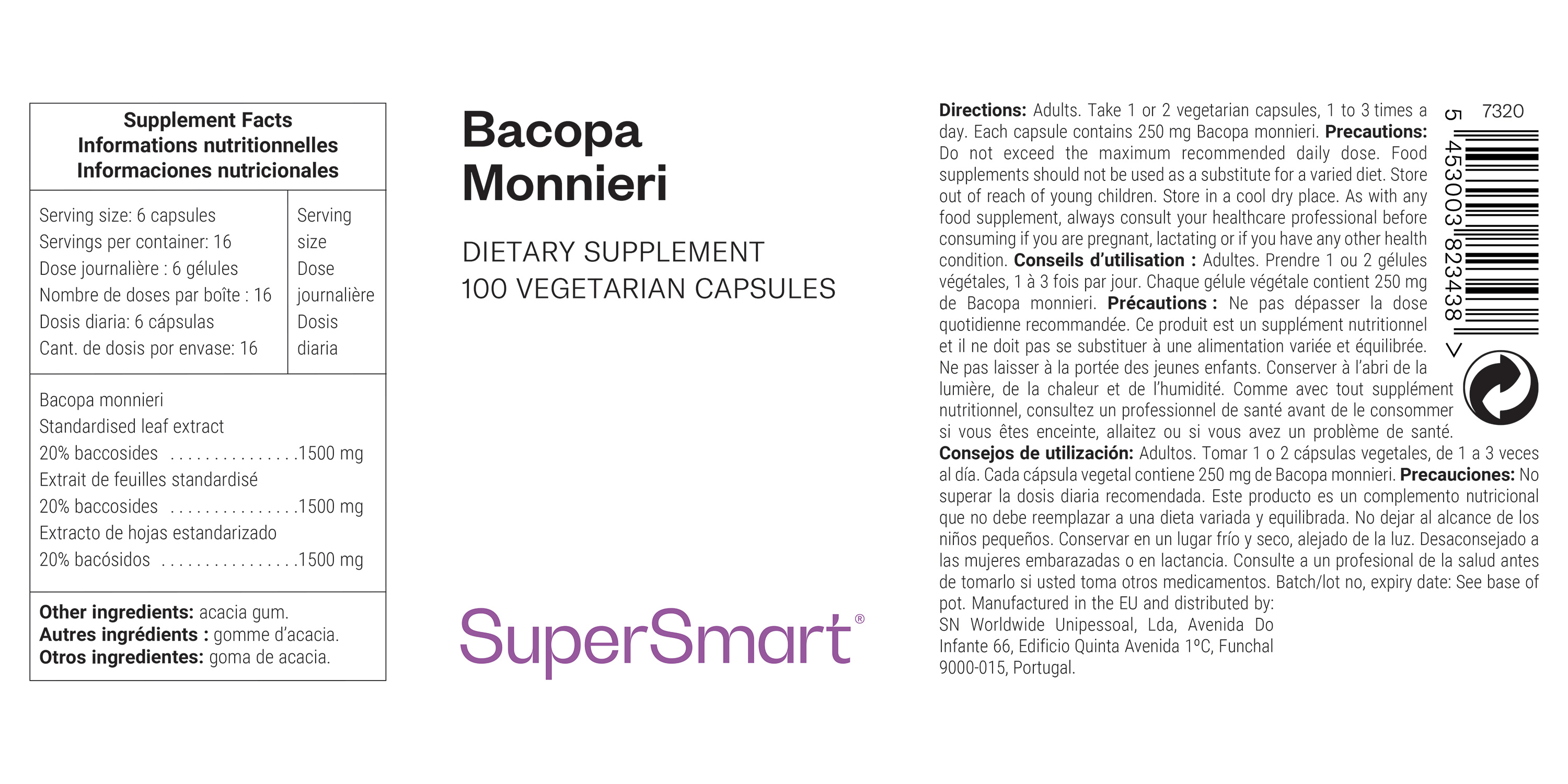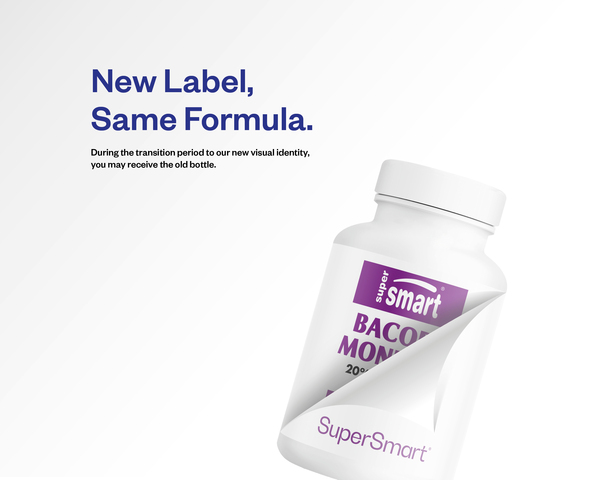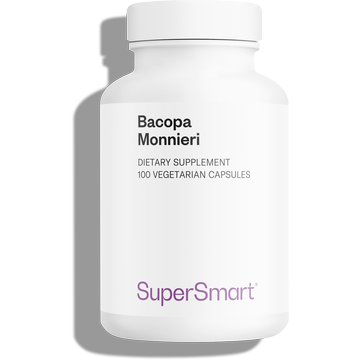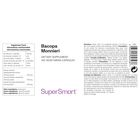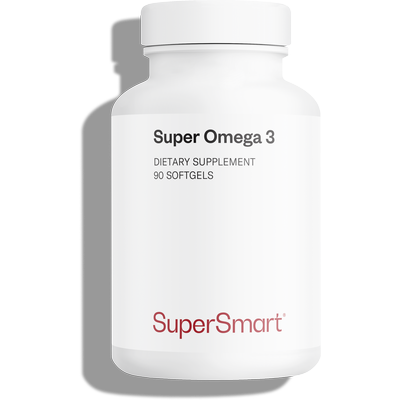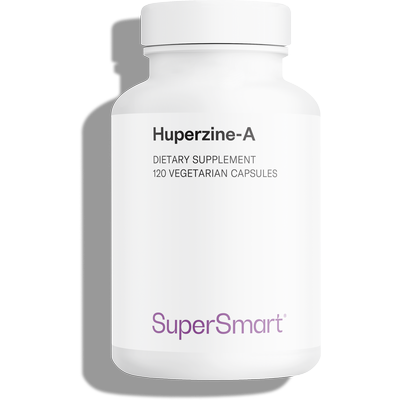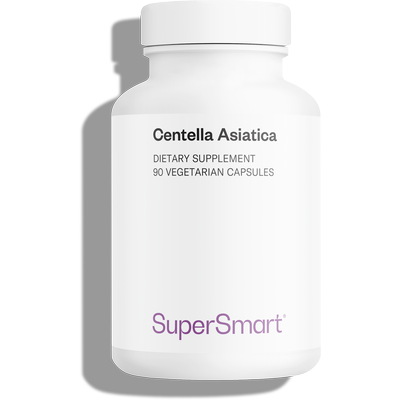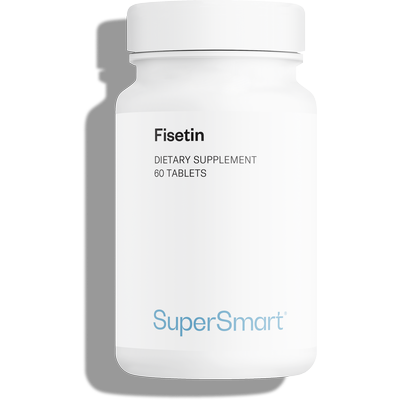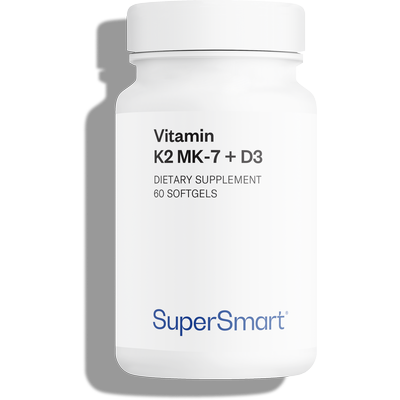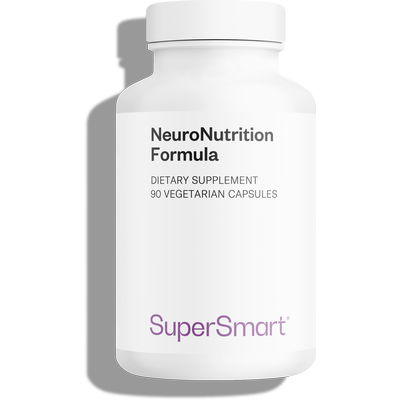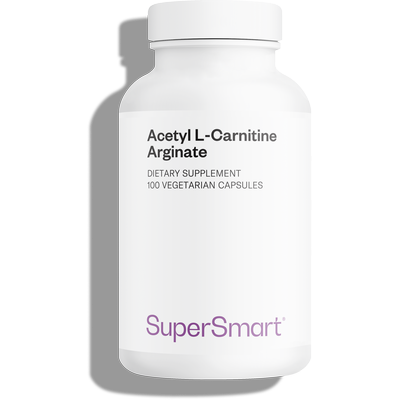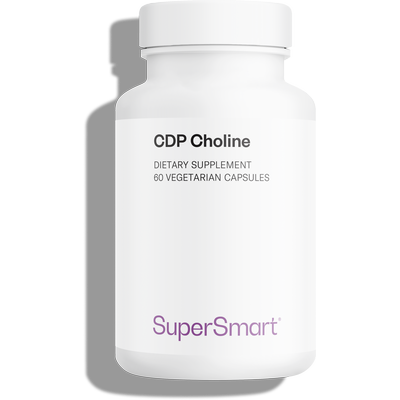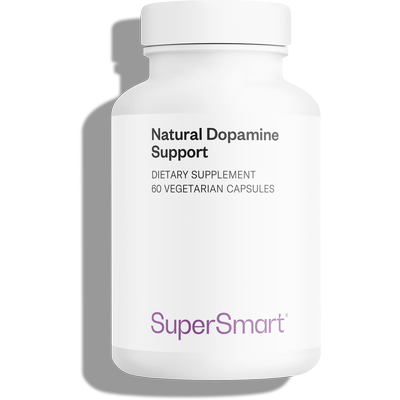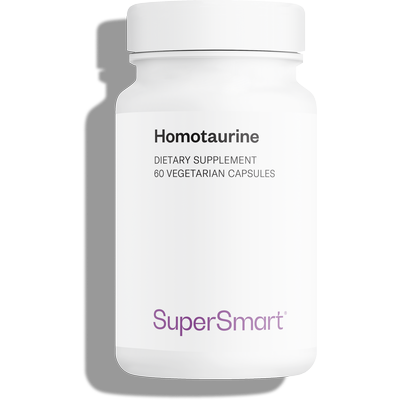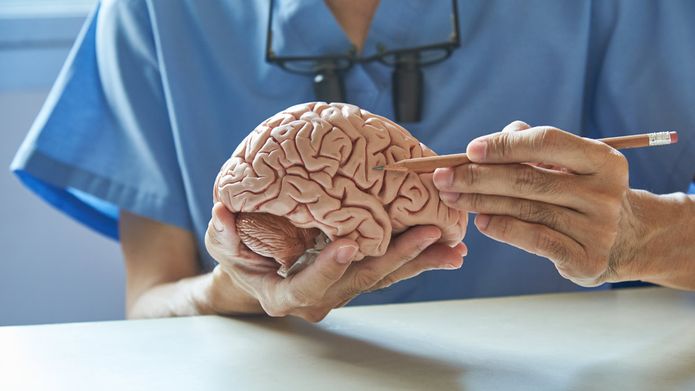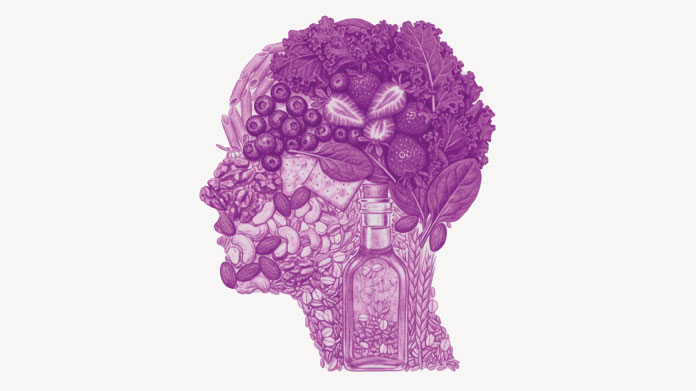Complete your selection
Inspired by the sacred practices of Ayurveda, Bacopa monnieri is a nootropic supplement in vegetarian capsules, made from Bacopa leaves and standardised to 20% bacosides (the chemical compounds responsible for its nootropic effects).
It helps improve memory, learning capacity and information-processing, while at the same time supporting the whole central nervous system in functioning properly. It is often combined with Ginkgo biloba, another ‘gold-standard’ of Ayurvedic medicine.
Who should take Bacopa Monnieri ?
Bacopa monnieri is aimed at many groups of people:
- Those over 50 who want to combat cognitive decline.
- Those who frequently experience recall problems and feel as if they’re losing their memory.
- Those wishing to boost their cognitive function.
- Those looking for a natural-source, traditionally used nootropic.
- Those with a parent, brother or sister affected by serious cognitive decline.
What benefits does Bacopa Monnieri offer?
According to ancient Ayurvedic writings, Bacopa monnieri was recommended for various conditions of the central nervous system and mind: attention deficit, memory problems, chronic stress, decline in cognitive performance… It was used to stimulate awareness and help maintain an alert mind.
Today, research is beginning to confirm such anecdotal use. Many studies, including clinical trials, suggest that extracts of Bacopa monnieri help to improve certain cognitive functions and maintain memory (1-3) (retrieval of information (4-5), learning capacity, associative memory (6), visual memory, work memory etc.).
As is the case for almost all Ayurvedic plants, scientists have discovered mechanisms of action that support the claims made for this nootropic.
Bacopa monnieri’s mechanisms of action
Bacopa monnieri primarily encourages the formation of synapses (7-9), the junctions between two neurons which ensure that information is transmitted and neural circuits are maintained. All our cognitive abilities depend on these circuits: if they become weak or disappear, our performance declines. How does Bacopa monnieri do this? By triggering the production of several molecules central to healthy synaptic function: glutamate and neutrophins such as BDNF and NGF (10-12). These molecules are crucial for initiating the process (13-14). They support the creation of neural circuits (an essential stage in learning), help to maintain existing circuits (vital for preserving memories) and are involved in a cascade of neuromolecular events that support cognitive performance.
Recent double-blind trials showed improvements in cognitive function following supplementation (15-16). Standardised extracts of Bacopa containing at least 20% bacosides (the compounds responsible for the previously mentioned effects) have also produced positive effects on short-term memory in healthy individuals (17-20).
5 good reasons to choose Bacopa Monnieri from SuperSmart
When deciding which Bacopa monnieri supplement to buy, be sure to keep in mind the benefits offered by our product:
- Bacopa leaves were traditionally pressed to extract the juice which was then dried into a powder and made into a very sweet syrup in order to mask the bitter taste of the Bacopa. Though 100% inspired by this ancient practice, Bacopa monnieri is a product with neither sugar nor bitterness.
- Bacopa monnieri is a leaf extract which contains all the naturally occurring compounds. It’s important to remember this as many cheaper supplements are made from the plant’s roots or stems.
- The vegetarian capsules contain 100 mg of Bacopa monnieri extract each, standardised to provide at least 20% bacosides.
- In India, Bacopa is currently recognised by medical authorities as a valid treatment for several types of mental and intellectual dysfunction.
- Bacopa monnieri contains no chemical bulking agents: just Bacopa monnieri leaves, acacia fibre and rice flour.
What is in Bacopa Monnieri
Any questions?
Our team of nutrition experts and scientists has the answers.
There are two types of intervention for improving aspects of cognition: taking nootropics such as Bacopa monnieri and brain training (21-23). A large number of studies show that brain training reduces age-related cognitive decline (24-27), and some suggest it is even more effective when combined with Bacopa monnieri supplementation.
The theory behind this potential synergy is quite simple.
Brain training reactivates neural circuits that were previously under-exploited or were in decline (28-30). As we age, many neural circuits disappear or become weaker in areas of the brain important for cognition and memory, such as the hippocampus, the striatum and the prefrontal cortex (31-32). When brain training is practiced frequently, it repeatedly reactivates these circuits and improves the connection between the neurons of which they're composed (33). As a result, it helps boost or reorganise them more effectively. This reinforcement involves several molecules mentioned earlier in this article: glutamate, BDNF and TGF. Molecules whose production is promoted by Bacopa.
In other words, brain training is the stimulus which signals to the body that it's time to boost its neural circuits. Bacopa is the supplier, providing the elements it needs in order to do so.
It's therefore highly recommended that alongside supplementation with Bacopa monnieri, brain training, such as puzzles, brain teasers and a range of cognitive tasks, is practised regularly. The aim of this combined approach is to counteract the cognitive losses that lead to decline. It needs to be maintained for at least 12 weeks to be effective.
Bacopa monnieri can also be combined with Ginkgo biloba supplements to increase blood supply to the brain and help maintain cognitive function.
If you're interested in other natural Ayurvedic products available to buy at Supersmart, you may wish to consider:
- An extract of Centella asiatica, traditionally used as a psychotropic to relieve mental fatigue.
- An extract of Boswellia serrata with an anti-inflammatory effect that may benefit the central nervous system.
- A Tribulus terrestris-based supplement (Tribulus terrestris), a plant which promotes healthy circulation and is traditionally used for stimulating the libido.
This product’s capsules are composed of HPMC (hydroxypropyl methylcellulose), a plant substance derived from cellulose. HPMC is widely used for medicines and dietary supplements. It contains no animal ingredients, is recognised as safe by health authorities and is considered more sustainable than synthetic alternatives.
As a precautionary measure, Bacopa monnieri is not recommended for women who are pregnant or breastfeeding. Bacopa monnieri can in theory increase the effects of phenothiazine, a neuroleptic drug.
october 27 2023
super merci beaucoup
june 3 2020
indispensable.
april 14 2020
Tres content
september 27 2025
Buenísimo para estar enfocado en jornadas de trabajo muy extensas
june 18 2025
produit efficace pour moi sénior pour garder une mémoire correcte
effective product for me as a senior to maintain a good memory
 see the translation
Translated by SuperSmart - see the original
see the translation
Translated by SuperSmart - see the original
Need help?
You may also like

